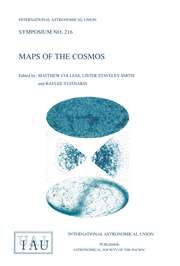No CrossRef data available.
Article contents
Hierarchical Clustering: Angular Momentum Density Anti-Correlation
Published online by Cambridge University Press: 04 August 2017
Extract
The growth of angular momentum in a general clustering scenario is analyzed and its dependence on the primordial density perturbation, δo, is calculated. High density peaks are found to evolve into low angular momentum and low spin parameter (η = J E½ G−1 M−5/2) systems. The basic mechanism behind this anti-correlation is that anisotropic structure, which leads to the growth of angular momentum, is statistically uncorrelated with δo. The collapse time, on the other hand, depends on δo and it is this time scale which determines the angular momentum of bound objects. Three cases are studied: (1) Lagrangian sphere (quasi-linear evolution): J (1σ)/J(3σ) = 3.3 and η (1σ)/η (3σ) = 1.9 where δ is given in σ(= <δ2>1/2)units.
- Type
- Research Article
- Information
- Copyright
- Copyright © Reidel 1987


